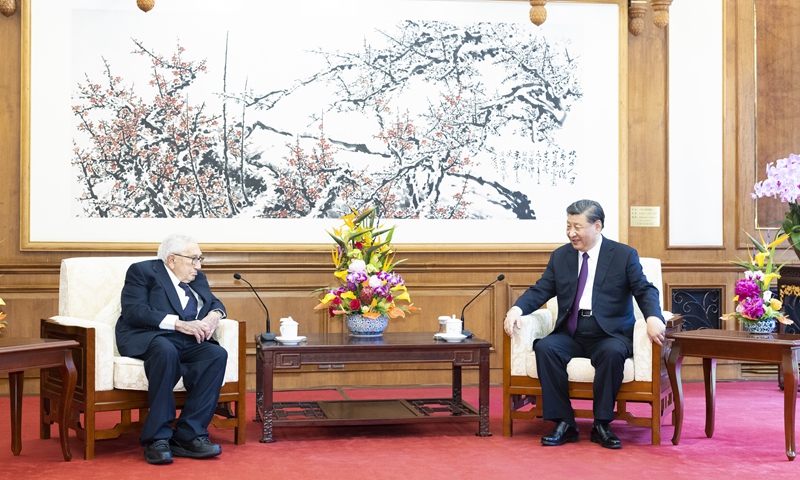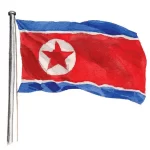In a meeting with revered former US diplomat Henry Kissinger on Thursday in Beijing, Chinese President Xi Jinping hailed him as an “old friend” whom the Chinese people never forget for his historic contributions to promoting China-US ties and stressed that China and the US can help each other succeed and prosper together. The Chinese president also expressed hope that Kissinger and other people of foresight in the US will continue to play a constructive role in restoring China-US ties to the right track.
As the China-US relations are again at a critical junction, the world needs to listen to the diplomatic wisdom of influential figures like the centenarian former US secretary of state who has a deep understanding of the concept of power balance, and such high-level reception in China unleashed a positive momentum in bilateral ties, showing that China’s US policy has always been consistent and China has been sincere to improving ties, Chinese analysts said.
The 100-year-old influential former US official has become the latest high-profile US public figure to visit China following trips made by some US incumbent officials such as US Secretary of State Antony Blinken, Treasury Secretary Janet Yellen and US climate envoy John Kerry, signaling an accelerating resumption of high-level interactions between the two countries and creating a positive momentum for improving the bilateral relations that have been entangled in a steep downturn due to Washington’s wrong China policy aiming at containing and encircling the country.
Some Chinese officials and experts also urged the US to “seize this momentum” to make concrete moves in line with the commitment made by US President Joe Biden in order to bring the bilateral relations back on right track, for example, by scrapping additional tariffs, facilitating people-to-people exchanges and setting boundaries on tech curbs, and most importantly, acting prudently on the Taiwan question.
‘Old friend never forgotten’
President Xi said at the meeting that Kissinger recently celebrated his 100th birthday and has paid more than 100 visits to China over the years. These two 100s give this visit special significance.
Xi also said that the Chinese people value friendship, they never forget their old friend, nor Kissinger’s historic contributions to promoting the growth of China-US relations and enhancing friendship between the two peoples.
Xi and Kissinger met at Villa 5 of the Diaoyutai State Guesthouse, the venue where the US former secretary of state’s first meeting with the Chinese leaders took place more than five decades ago.
Fifty-two years ago, when China and the US were at a crucial inflection point, Chairman Mao Zedong and Premier Zhou Enlai and President Richard Nixon and Kissinger, with their extraordinary strategic vision, made the right decision for China-US cooperation and launched the process of normalizing the China-US relationship, Xi said.
The world is undergoing momentous transformations unseen in a century and the international landscape is going through major shifts. China and the US have once again come to a crossroads, which requires another decision by the two sides about where to go from here, Xi said.
Looking ahead, China and the US can help each other succeed and prosper together. The key is to follow the three principles of mutual respect, peaceful coexistence and win-win cooperation, the Chinese top leader said.
A major message delivered by the Chinese leader is that China’s definition about the China-US relations has been consistent and persistent, expressing its initial intention about the bilateral relations that is “the cooperation between the two countries serves as the biggest guarantee to a stable world,” Lü Xiang, a research fellow at the Chinese Academy of Social Sciences, told the Global Times on Thursday.
“The China-US relations are now the biggest global issue because if the relations are not properly handled, the already fragile global economy would face a collapse,” Lü said.
During the meeting, Kissinger stressed that the US-China relationship is essential to peace and prosperity of the two countries and the wider world. Under the current circumstances, it is imperative to maintain the principles established by the Shanghai Communiqué, appreciate the utmost importance China attaches to the one-China principle, and move the relationship in a positive direction.
However, some US media and observers have been playing down the role that the centenarian former US secretary of state could play in influencing the current policy-making in Washington. Asked about Kissinger’s trip on Tuesday, US State Department spokesperson Matthew Miller was quoted as saying in the media reports that the 100-year-old did not represent the US government.
Still, Miller noted that Kissinger had briefed American officials on his interactions with Chinese officials in the past, and that similar conversations could occur after this trip, the New York Times reported.
“We have seen some rational voices coming out from the US strategic and academic spheres about the US-China relations, and Kissinger represents those voices. It’s important to gather those voices to exert certain influence to the US government,” Sun Chenghao, a fellow and head of US-EU program at Center for International Security and Strategy in Tsinghua University, told the Global Times on Thursday.
Xie Feng, the Chinese Ambassador to the US, said at the Aspen Security Forum on Wednesday that the so-called “political correctness” permeates all aspects of American society. He said since he took up his post in the US a month ago, he has had extensive contact with many people from all walks of life who support the development of China-US relations.
But due to the “chilling effect,” they have concerns and pressures. Against the backdrop of the “anti-China chorus,” they dare not speak out publicly or express dissenting opinions, Xie said, noting that an American netizen left him a message on Twitter saying that people who support the US-China relationship are still there, but are hiding. It is necessary for the ambassador to find them one by one, Xie cited the message.
Having survived WWII – the biggest disaster in the world, Kissinger has spent half of his lifetime interacting with China, representing probably the highest level of diplomatic wisdom in the US, which we should highly value, Lü said. “Almost every government respected some of his opinions to some extent, and almost every government would express the respect and consult him in a different way.”
To seize the momentum
Kissinger’s visit overlapped with Kerry’s high-profile visit to Beijing, which wrapped up on Wednesday and helped the resumption of the climate cooperation talks between the two countries that had been halted since the provocative visit of former House Speaker Nancy Pelosi to the island of Taiwan in August 2022.
Some experts said the latest frequent high-level interactions between the two countries create some positive momentum to improve the bilateral relations. But that still depends on whether Washington can seize this opportunity and make concrete moves to adjust some of its wrong and negative policies toward China, they said.
“The two countries enhanced dialogue to avoid the worse than worst, but we have not seen any positive moves on issues such as additional tariffs on Chinese goods, tech restrictions or the Taiwan question. We don’t expect the US to do everything it should do at once, but at least it needs to have a start,” Lü said.
For instance, the US should reduce the negative list, stop sanctioning Chinese entities and individuals, and prevent “black swan” and “grey rhino” events from causing new disturbances and shocks to China-US relations, Xie said.
Also, it should extend the positive list, strengthen dialogue, and expand cooperation with a sense of sincerity, starting from scratch to inject positive energy to the development of China-US relations, such as increasing passenger flights, adjusting travel advice to China, renewing the US-China agreements on scientific cooperation, the Chinese envoy said.
“It’s highly unlikely that the US will adjust its overall China policy of defining China as a strategic rival but it’s possible that it may make some adjustments in some areas, for example, in the tech sector the US should stop wantonly cracking down on Chinese firms,” Sun said.
(Global Times)




